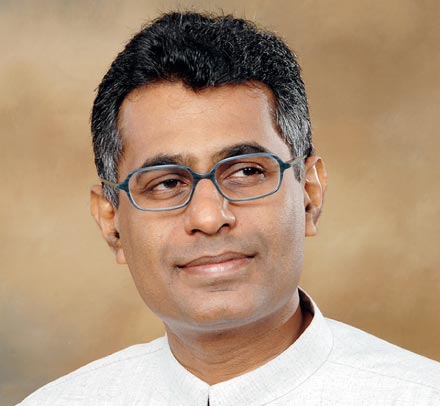Tuesday Feb 17, 2026
Tuesday Feb 17, 2026
Friday, 9 June 2023 01:53 - - {{hitsCtrl.values.hits}}

United Republic Front Leader Patali Champika Ranawaka, MP

United Centenary Front Leader Prashan De Visser
|
 In his recent address to the nation President Ranil Wickremesinghe said the country’s national transformation roadmap will be based on four pillars to drive economic growth. The four pillars are financial reforms, investment promotion, social safety net and restructuring of state-owned enterprises. These are all good things, but I was dismayed not to see a value pillar. Values are implicit in the message, but an explicit expression would have made his message more complete. For example, transparency is one of five outcomes. In reality, transparency which could be a proxy for many values in government and conveys the message of good governance should have been given prominence as a pillar.
In his recent address to the nation President Ranil Wickremesinghe said the country’s national transformation roadmap will be based on four pillars to drive economic growth. The four pillars are financial reforms, investment promotion, social safety net and restructuring of state-owned enterprises. These are all good things, but I was dismayed not to see a value pillar. Values are implicit in the message, but an explicit expression would have made his message more complete. For example, transparency is one of five outcomes. In reality, transparency which could be a proxy for many values in government and conveys the message of good governance should have been given prominence as a pillar.
In contrast, new parties seem to be giving a lot of weight to values. To the best of my knowledge, three new parties have joined the fray of 86 existing parties in the last few weeks. They are the United Centenary Party, United Republic Party and Social Justice Party. The publication of the Social Justice Party founded by my friend Naja Mohammad is currently available only in Tamil, so I could not study it at this time around. However, I had the opportunity to participate in the inauguration ceremony of the United Republic Front, formed on 22 May, Republic Day under the leadership of Patali Champika Ranawaka, MP. Although I could not attend the inauguration ceremony of the Centenary Front led by Prashan de Visser, I believe I can make some judgments from their published documents as one who has been eagerly watching the evolution of that party for a long time.
This column is focused on two new parties – The United Centenary Front and the United Republic Front.
The uniqueness I see in both parties is the priority given to values. Other recent parties may have stressed on values, but for now I focus on the two newest parties.
Political party system is the backbone of a democracy. It is the mechanism that allows those with similar ideologies, values, and goals to get together and strive to gain political power. The United Centenary Front and the United Republic Front have many similarities in their stated values and objectives, but Patali’s United Republic Front is unique in its use of pragmatism as a value. I see pragmatism more as an ideology or an approach than a value per se. I will first address that issue.
Pragmatism not a value but an ideology?
Former Prime Minister of Singapore, Lee Kuan Yew may have been the first leader to introduce pragmatism to politics as an ideology. Deng Xiaoping’s saying, “It doesn’t matter if the cat is white or black, as long as it catches mice” is also associated with pragmatism. Indonesia’s President Jokowi is also considered a pragmatist. For example, he appointed his closest rival at the 2019 presidential election as a powerful member of his Cabinet.
The leader of the United Republic Front, Patali Champika Ranawaka, explains pragmatism as follows: “We need a new political pragmatism to move the country forward, not the outdated socialist or capitalist ideology that is being followed now.”
Here pragmatism is defined by what it is not. It is not hard-line capitalism or socialism.
Parties such as Prashan De Visser-led Centenary Front or the recently formed United National Freedom Front led by Maithri Gunaratne seem to give more priority to their vision for the country rather than name the approach or the ideology they would adopt. But pragmatism is implicit in their vision.
In contrast, a look at the constitutions submitted to the Election Commission by other, older political parties suggest that pragmatism may be something new in our political sphere.
Meanwhile, two Parties that show a clear ideology according to their published constitutions are the Janatha Vimukthi Peramuna (JVP) and the Sri Lanka Freedom Party (SLFP).
The JVP clearly states in its constitution that its aim is to “displace the existing capitalist system with a new socialist social system”.
The SLFP states in its opening chapter that they are guided by “democratic principles, socialist principles of creating a classless society, and thirdly religious and cultural revival and development.”
The constitution of the United National Party states that acceptance of the party’s principles, policies and codes of conduct is necessary for membership, but there is no specific reference to those. At the outset, the party is described as one dedicated to non-racist and non-sectarian democracy and the objectives of the party are to recognise universal suffrage and the fundamental rights of the people and provide equal rights and opportunities to all.
Two main parties that have come to the fore in the last five years, Samagi Jana Balawegaya (SJB) and Sri Lanka Podujana Permuna (SLPP) give us an idea about their values through their objectives.
The purpose of the SJB is “to provide equal opportunities for all, give priority to knowledge-based innovation and skills, and move forward together through a competitive economy with consideration for the vulnerable sections in society”.
The SLPP says many good things about democracy, freedom, and the independence of the judiciary, etc., but as I see it, the uniqueness of that party lies in the statement, “following the local culture and values and identifying local resources and developing them to raise the economic well-being of the people.” In fact, during President Gotabaya Rajapaksa’s tenure 2019-2022 that led to or hastened the economic crisis, he had indeed followed the policies of the party to a fault.
Values of the two newest parties
The values of the Republic Front are honesty, openness, pragmatism, empathy and meritocracy. I argued earlier that I see pragmatism is an ideology.
The values of the Centenary Front are – honesty, transparency, inclusiveness, competency, democracy, trustworthiness, compassion, humility, accountability and progressiveness.
The United Republic Front is a party headed by a mature politician, while the United Centenary Front is composed of young political novices. It is unique in the sense that both men and women have leadership in equal measure. Still there are striking similarities between the values of the two parties.
Values of integrity, meritocracy, and inclusiveness – values first enunciated by the founding prime minister of Singapore, Lee Kuan Yew, and now adopted as Singapore’s values – provide a good foundation for any country, party or public organisation. In fact, apart from pragmatism, the United Republican Front’s values of honesty, openness, meritocracy and empathy more or less align with the values of Singapore, if empathy is taken as a value that underlies inclusiveness.
Four of the ten values of the Centenary Front, i.e. – honesty, transparency, competency and inclusiveness also overlap with the basic values we identified. We need to think further whether the six additional values presented by the Centenary Front –namely, democracy, trustworthiness, compassion, humility, accountability and progressiveness, should be included as additional basic values, since they are perceived to be important by a new generation of aspiring political leaders.
Finally, whatever is on paper, we need to pay attention to what the parties do with the values they espouse.